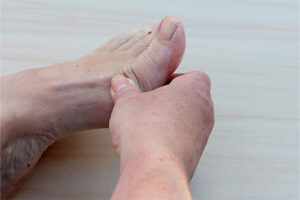Dermatology
Plaque Psoriasis
Obesity and Metabolic Health in Patients With Psoriasis
Overview
Psoriasis is increasingly being recognized as a systemic inflammatory disorder with impacts beyond the skin and joints. Obesity and psoriasis, both chronic inflammatory states, appear to be interconnected on several different levels.
Expert Commentary
Joel M. Gelfand, MD, MSCE
|
|
“Ultimately, if patients are able to obtain weight control, either through dietary changes and exercise, some of the medical therapies that are becoming available online, or surgical treatments, it can improve not only their overall health but also their psoriasis and their response to psoriasis therapies.”
Clearly, people with psoriatic disease have a higher prevalence of insulin resistance and metabolic syndrome, and the reasons for this are not entirely understood. Obesity is an independent risk factor for the development of psoriasis, and it is also associated with more severe psoriasis.
We have seen that, if you look at the body surface area (BSA) in a large cross section of patients, their likelihood of having metabolic syndrome increases (ie, the larger the BSA affected by psoriasis, the more likely you are to have metabolic syndrome). And that relationship does not appear to be entirely due to obesity, as reported by my lab. In another study, we found a clear relationship between the percent BSA in psoriasis and the incidence of type 2 diabetes. After adjusting for age, sex, and body mass index (BMI), the rates for developing diabetes increased by 20% for every 10% increase in BSA.
These types of findings suggest that BMI is not the only driver for the increased risk of insulin resistance and metabolic syndrome observed in individuals with psoriasis. There is something about psoriasis disease activity in the skin that seems to be predictive of developing diabetes over time. There are some shared overlapping genetic features of psoriasis and diabetes; however, it is very difficult to know for sure whether it is the psoriasis or the skin activity that is really driving the incident diabetes, or whether there are perhaps other factors related to skin that are at play here.
One thing that we do know with greater certainty is that individuals who are very overweight tend to struggle with getting their psoriasis under control and generally do not respond as well to therapy; when they respond well, they are more likely to lose response over time. Additionally, biologic therapies do not meaningfully improve the markers of insulin resistance relative to placebo. Even when you clear the psoriasis, these patients still have a residual risk of having metabolic problems.
Losing weight is a significant challenge. Having a high BMI is often something that people do not want to talk about. Either the clinician does not want to talk about it and/or they are reluctant to bring it up with the patient, or there may be sensitivities about it from the patient’s perspective. I think that clinicians need to let patients know what their options are for managing obesity. So, for example, in addition to a healthy diet, exercise, and medical therapies, we should be mindful of bariatric surgery as an option for certain individuals who have a BMI of greater than or equal to 40, or are more than 100 pounds overweight or have a BMI of greater than or equal to 35 and one or more obesity-related comorbidities. A Swedish study showed that patients who underwent gastric bypass surgery had a reduced risk of developing psoriasis over time and had an improved prognosis of psoriasis, which are powerful findings.
Ultimately, if patients are able to obtain weight control, either through dietary changes and exercise, some of the medical therapies that are becoming available online, or surgical treatments, it can improve not only their overall health but also their psoriasis and their response to psoriasis therapies.
References
Assan F, Tubach F, Arlegui H, et al; Psobioteq. First-line biologic therapy and obesity in moderate-to-severe psoriasis: results from the prospective multicenter cohort Psobioteq. Dermatology. 2021;237(3):338-346. doi:10.1159/000513398
Dai Y-X, Shen Y-J, Chou Y-J, et al. Obesity, but not metabolic diseases, is associated with risk of psoriasis: a population-based cohort study in Taiwan. Dermatology. 2020;236(6):521-528. doi:10.1159/000508303
Egeberg A, Sørensen JA, Gislason GH, Knop FK, Skov L. Incidence and prognosis of psoriasis and psoriatic arthritis in patients undergoing bariatric surgery [published correction appears in JAMA Surg. 2018;153(7):692]. JAMA Surg. 2017;152(4):344-349. doi:10.1001/jamasurg.2016.4610
Gisondi P, Bellinato F, Girolomoni G, Albanesi C. Pathogenesis of chronic plaque psoriasis and its intersection with cardio-metabolic comorbidities. Front Pharmacol. 2020;11:117. doi:10.3389/fphar.2020.00117
Langan SM, Seminara NM, Shin DB, et al. Prevalence of metabolic syndrome in patients with psoriasis: a population-based study in the United Kingdom. J Invest Dermatol. 2012;132(3 pt 1):556-562. doi:10.1038/jid.2011.365
Maglio C, Peltonen M, Rudin A, Carlsson LMS. Bariatric surgery and the incidence of psoriasis and psoriatic arthritis in the Swedish Obese Subjects study. Obesity (Silver Spring). 2017;25(12):2068-2073. doi:10.1002/oby.21955
Paroutoglou K, Papadavid E, Christodoulatos GS, Dalamaga M. Deciphering the association between psoriasis and obesity: current evidence and treatment considerations. Curr Obes Rep. 2020;9(3):165-178. doi:10.1007/s13679-020-00380-3
Snekvik I, Nilsen TIL, Romundstad PR, Saunes M. Metabolic syndrome and risk of incident psoriasis: prospective data from the HUNT study, Norway. Br J Dermatol. 2019;180(1):94-99. doi:10.1111/bjd.16885
Snekvik I, Smith CH, Nilsen TIL, et al. Obesity, waist circumference, weight change, and risk of incident psoriasis: prospective data from the HUNT study. J Invest Dermatol. 2017;137(12):2484-2490. doi:10.1016/j.jid.2017.07.822
Wan MT, Shin DB, Hubbard RA, Noe MH, Mehta NN, Gelfand JM. Psoriasis and the risk of diabetes: a prospective population-based cohort study. J Am Acad Dermatol. 2018;78(2):315-322.e1. doi:10.1016/j.jaad.2017.10.050











